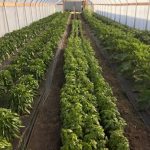On March 25th, 2021, the High Desert Food and Farm Alliance submitted written comments to the Deschutes County Planning Commission to inform the group of farmer and rancher perspectives on county-level regulations. The comments will be used to shape the Community Development Department Work Plan with specific emphasis on supporting rural economic development activity. Read on for the full letter:
To the Deschutes County Community Development Director,
Thank you for collecting written comments on behalf of the Deschutes County Commissioners Office. The High Desert Food and Farm Alliance is a 501c3 non-profit serving the tri-county area of Crook, Deschutes, and Jefferson counties. Since 2012, we have sought to support the local community of food growers, raisers, crafters, and consumers, through education, marketing, and other supports. We are writing to provide comment on behalf of our agricultural community partners to bring to the attention of the County Planning Commission Community Development Department concerns of county-level zoning and permitting regulations that impede on the operations and growth of many of these farm and ranch businesses.
After speaking with a number of High Desert Food and Farm Alliance farmer and rancher partners, we’ve identified three main areas for the Deschutes County Commissioners Office to focus their work: Agritourism/On-Farm Sales Restrictions, Temporary Labor Housing Permits, and Meat Processing Limitations.
Agritourism and On-Farm Sales Restrictions
- We have heard from multiple partners that the permitting process and associated fees for starting a farmstand or agritourism operation are prohibitive, especially for newer and smaller operations.
- Between the administrative determination, site plan review, landscape management site plan review, and a permit fee for a sign, one farmer calculated that just to get started they would need to invest $3,000 into the permitting process alone. This start up cost is prohibitive to this operation and does not make economic sense for them at this time. However, they feel that they are losing out on sales by not being able to offer a farmstand on their property selling products sourced within Oregon at their operation. They also expressed that the permitting fees are one size fits all despite the scope of the project, which dissuades smaller and newer operations from entering new markets.
- Partners have asked for clarity in current regulations surrounding the maximum number of events allowed per permit, specifically with regards to farm dinners prepared with food grown/raised on-farm. Example: A farmer can create and sell 100 meals daily for take-away through their farm store, but if they want to offer a farm-to-table dinner for 15, it counts as an event. Partners have asked for this regulation to be reexamined for potential allowances of small on-farm dinners as unique and separate from larger events (e.g. weddings).
Temporary and Long-Term Labor Housing Permits
- Some of our partners have voiced that the regulations surrounding the number of dwellings on an EFU property are unclear and/or antiquated. Many of our partners rely heavily on seasonal labor and with increasing housing costs in the county, they would prefer to offer their workers lodging. A review of non-relative worker housing regulations would be appreciated by many of our partners.
- Another farmer also noted that the regulations for labor housing have an annual size and income limit which is virtually unachievable for smaller producers. They feel like this dissuades them from hosting apprentices, which in turn leads to a reduced number of beginning farmers and ranchers for the region.
Meat Processing Limitations
- Meat processing capacity limitations are a major issue in our region for a majority of ranchers. With only two USDA-inspected slaughter facilities in Central Oregon, ranchers are competing for slaughter dates and transporting their livestock out of the region for processing resulting in negative impacts on the environment, animal welfare, and the region’s economics. We encourage the county to invest time from planners into working on eliminating the barriers that may impact custom-exempt facilities in the county from becoming USDA-inspected, such as waste disposal.
Thank you for taking the time to review our comments and we look forward to seeing the finalized 2021-2022 Work Plan addressing these issues.
Sincerely,
Annie Nichols
Farm and Ranch Support Manager
High Desert Food and Farm Alliance






